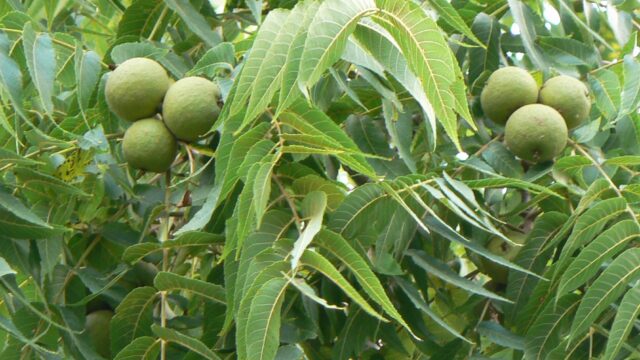 Black walnuts (Juglans nigra) are important trees for attracting birds and wildlife and supporting a healthy food chain. They host at least 23 species of moths, including dagger moths, luna moths, and walnut caterpillar moths, which are a food source for songbirds like chickadees, bluebirds, nuthatches, wrens, and others. Walnuts are a valuable food for crows and bluejays, and also mammals like squirrels and chipmunks, which become prey for hawks, owls, and larger mammals.
Black walnuts (Juglans nigra) are important trees for attracting birds and wildlife and supporting a healthy food chain. They host at least 23 species of moths, including dagger moths, luna moths, and walnut caterpillar moths, which are a food source for songbirds like chickadees, bluebirds, nuthatches, wrens, and others. Walnuts are a valuable food for crows and bluejays, and also mammals like squirrels and chipmunks, which become prey for hawks, owls, and larger mammals.
In addition to all this, walnut trees are adaptable hardy natives that provide beautiful shade canopies in the landscape. And Black walnuts have higher levels of antioxidants, polyunsaturated fatty acids, and other health-promoting compounds than the more common English walnuts, making them useful in reducing the risk of cancer, heart disease, and diabetes.
Because walnuts produce the chemical juglone to reduce competition for resources they can pose a challenge in landscape planning. Sensitive plants located under allelopathic trees are most susceptible to contact with juglone through direct root contact or accumulation of the toxin from leaves and nut hulls in poorly aerated, wet soils with limited microbial activity and organic matter. Well-drained and aerated soils with a healthy population of microbes can accelerate the decomposition of juglone, making it easier to successfully grow landscape plants near allelopathic trees. Keep in mind that juglone toxicity may persist for years after a tree is removed.
The most common symptoms of juglone sensitivity in landscape plants are yellowing and wilting of foliage — especially during hot dry periods in summer — ultimately resulting in the death of the plant. Although not as strong as black walnut, some other trees also produce allelochemicals, including sugar maple, tree of heaven, hackberry, hickory, sycamore, cottonwood, black cherry, red oak, black locust, sassafras, and American elm.
Some tips for garden planning with black walnuts and other alleopathic trees:
• Locate gardens away from tree canopies.
• Create raised and lined beds to reduce root contact.
• Improve soil drainage by adding organic matter.
• Prevent leaves, hulls, and stems from decomposing near planting areas.
• Avoid mulch containing walnut bark, wood, hulls, and leaves
• Install plants tolerant of juglone (see lists below — we’ll keep adding as we confirm hardiness of additional plants)
Trees Tolerant to Juglone
Most maples except silver maple (Acer spp)
Eastern Red Cedar (Juniperus virginiana)
Ohio Buckeye (Aesculus glabra)
Goldenrain Tree (Koelreuteria paniculata)
Serviceberry (Amelanchier)
Sweetgum (Liquidambar styraciflua)
Pawpaw (Asimina triloba)
Yellow Poplar (Liriodendron tulipifera)
River Birch (Betula nigra)
Black Gum (Nyssa sylvatica)
Hickory (Carya spp)
Catalpa (Catalpa bignoniodes)
Sycamore (Platanus occidentalis)
Eastern Redbud (Cercis canadensis)
Black Cherry (Prunus serotina)
Fringetree (Chionanthus spp.)
Flowering Dogwood (Cornus florida)
Oak species (Quercus spp)
Dogwood (Cornus alternifolia)
Staghorn Sumac (Rhus typhina)
Hawthorne (Crataegus spp)
Black Locust (Robinia pseudoacacia)
Persimmon (Diosypros virginiana)
Sassafras (Sassafras albidum)
American Beech (Fagus grandifolia)
Arborvitae (Thuja occidentalis)
Canada Hemlock (Tsuga Canadensis)
Honeylocust (Gleditsia triacanthos)
American Elm (Ulmus americana)
Carolina Silverbell (Halesia caroliniana)
Shrubs Tolerant to Juglone
Barberry (Berberis spp)
Beautyberry (Callicarpa americana)
Hazelnut (Corylus americana)
Daphne (Daphne spp)
Forsythia (Forsythia spp)
Witchhazel (Hamamellis spp)
Rose of Sharon (Hibiscus syriacus)
Snowball Hydrangea (Hydrangea arborescens)
St. Johnswort (Hypericum prolificum)
American Holly (Ilex opaca)
Juniper (Juniperus spp)
Spicebush (Lindera benzoin)
Mockorange (Philadelphus spp)
Sumac (Rhus copallina)
Smooth Sumac (Rhus glabra)
Current (Ribes spp)
Black Raspberry (Rubus occidentalis)
Elderberry (Sambucus Canadensis)
Viburnum (Viburnum spp)
Vegetables Tolerant to Juglone
Onion
Beets
Squash and Melons
Carrot
Parsnips
Beans
Corn
Fruit Trees Tolerant to Juglone
Cherry, Nectarine, Plum, Peach (Prunus spp)
Quince (Cydonia oblongata)
Perennial Vines Tolerant to Juglone
Clematis (Clematis spp)
Virginia Creeper (Parthenocissus quinquefolia)
Wild Grape (Vitis)
Wisteria (Wisteria spp)
Perennials Tolerant to Juglone
Yarrow (Achillea spp)
Bugleweed (Ajuga reptans)
Hollyhock (Alcea rosea)
Anemone (Anemone spp)
Jack-in-the-Pulpit (Arisaema triphyllum)
Aster (Aster spp)
European Wild Ginger (Asarum europaeum)
Astilbe (Astilbe spp)
Bellflower (Campanula)
Turtlehead (Chelone sp.)
Chrsyanthemum (Chrysanthemum spp)
Dutchman’s Breeches (Dicentra cucullaria)
Bleeding Heart (Dicentra spp)
Crested Wood Fern (Dryopteris cristata)
Purple Coneflower (Echinacea purpurea)
Globe thistle (Echinops)
Epimedium (Epimedium spp)
Sweet Woodruff (Galium odoratum)
Gentian (Gentian spp)
Cranesbill Geranium (Geranium sanguineum)
Christmas Rose (Helleborus spp)
Common Daylily (Hemerocallis spp)
Coral Bells (Heuchera spp)
Orange Hawkweed (Hieracium auranticum)
Sunflower / Jerusalem Artichoke (Helianthus spp)
Hosta (Hosta spp)
Iris (Iris spp)
Shasta Daisy (Leucanthemum x superbum)
Liriope or Lilyturf (Lirope spp)
Lobelia (Lobelia spp)
Virginia Bluebell (Mertensia pulmonariodes)
Bee Balm (Monarda spp)
Primrose and Sundrops (Oenothera spp)
Blue wood phlox (Phlox divaricata)
Phlox (Phlox paniculata)
Solomon’s Seal (Polygonatum commutatum)
Lungwort (Pulmonaria spp)
Cinnamon Fern (Osmunda cinnamomea)
Mayapple (Podophyllum peltatum)
Jacob’s Ladder (Polemonium reptans)
Christmas Fern (Polystichum acrostichoides)
Bloodroot (Sanguinaria canadensis)
Siberian or Blue Squill (Scilla siberica)
Stonecrop (Sedum acre, Sedum spectabile)
Lamb’s Ear (Stachys byzantia)
Celandine poppy (Stylophorum diphyllum)
Meadowrue (Thalictrum spp)
Spiderwort (Tradescantia virginiana)
Trillium (Trillium spp)
Globeflower (Trollius spp)
Pansy and Violet (Viola spp)
Annuals Tolerant to Juglone
Pot Marigold (Calendula officinalis)
Zinnia (Zinnia spp
Annual Vines Tolerant to Juglone
Morning Glory (Ipomoea spp)
Bulbs Tolerant to Juglone
Crocus (Crocus spp)
Snowdrop (Galanthus nivalis)
Grape Hyacinth (Muscari botryoides)
Daffodil (Narcissus spp)
Tulips (Tulipa spp)
